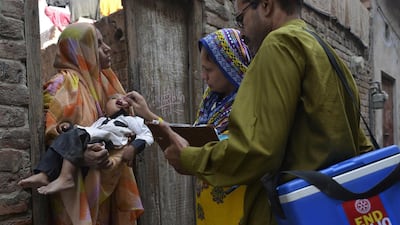As a father, I feel the pain of those parents whose children are afflicted with thalassaemia, an inherited blood disorder. The condition causes a deficiency of haemoglobin, a protein in red blood cells that carries oxygen, which leads to anaemia. The patient requires regular blood transfusions or red blood cell infusions to maintain an adequate supply of haemoglobin. In most cases, patients receive transfusions every two to three weeks.
More than 100,000 are affected by the disorder in Pakistan, where around 5,000 babies are born with thalassaemia each year.
Lack of awareness is the biggest cause of cases. There are many Pakistanis who do not consider thalassaemia as a possible condition. They just consider their medical issues to be related to an iron deficiency.
A bone-marrow transplant is one treatment option for thalassaemia, but there are only two institutes – one in Karachi and other in Rawalpindi – providing this treatment. A transplant can cost up to 3 million rupees (Dh108,000), a sum that is unaffordable for the vast majority of people in a country where more than 40 per cent of its 180 million people live below the poverty line.
In this gloomy situation, Bait-ul-Mal, a public sector body in Islamabad, has emerged as the light at the end of a dark tunnel.
The organisation runs the state-of-the-art Pakistan Thalassaemia Centre, which offers free treatment for the poor and underprivileged.
Approximately 20 patients, mostly children, are treated at the facility every day. In the past three years, Bait-ul-Mal has also provided financial assistance to a further 1,500 thalassaemia patients.
Led by its managing director, Abid Waheed, Bait-ul-Mal has taken a step in the right direction by taking the fight against thalassaemia to the poor and neglected sections of society.
What is needed now is a comprehensive awareness campaign to fight the ailment around the country.
A mass education programme should be initiated by the government so that young students can become better informed about the disorder. Similarly, a local media campaign should be launched to raise awareness about the symptoms.
Medical experts should be required to carry out the premarital counselling of young people and screen their families to help these couples understand the possible consequences of carrier marriages.
The country still lacks a national transplant registry, which must be established. The government should develop a fellowship training programme for all specialist doctors and paramedics. Haemoglobin electrophoresis is a special blood test conducted to identify the gene causing this hereditary blood disorder. The government should establish facilities for this test in districts, particularly in rural areas, across Pakistan.
Various studies suggest that children in remote areas succumb to this disease because of the lack of treatment facilities.
No doubt serious efforts are being made by some NGOs to provide a better quality of life and increased survival in thalassaemia patients, but a lot has still to be done in the fight against this deadly disorder in the least developed South Asian nation.
The government should take charge of this “war” on thalassaemia and allocate adequate resources in the budget to fight this affliction.
Syed Fazl-e-Haider is a development analyst in Pakistan

